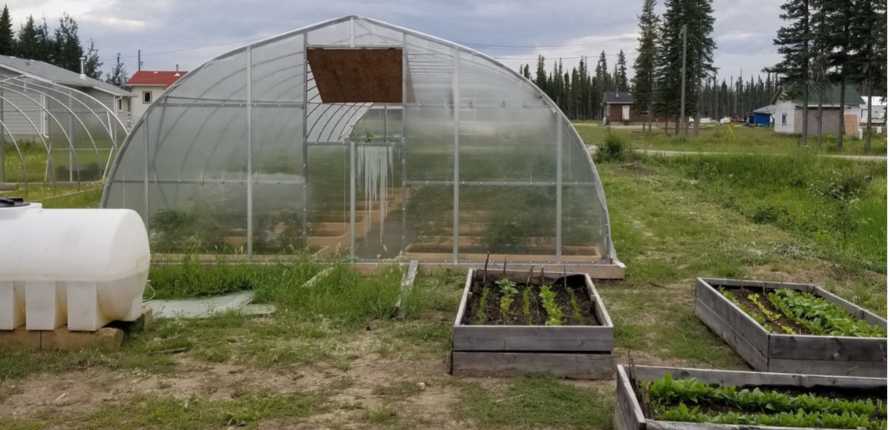We use cookies on this site to enhance your experience.
By selecting “Accept” and continuing to use this website, you consent to the use of cookies.
Search for academic programs, residence, tours and events and more.
Agroecology offers a model for agriculture in the North that centers the relationship between humans and the environment, prioritizes long-term land stewardship over short-term yields, works within the unique boreal landscape, and supports Indigenous sovereignty.

Greenhouse and garden in Kakisa
Interest in growing food in the North is increasing. It is important to ensure that agricultural practice, policy, and funding upholds Indigenous ways of being on the land. In particular, agriculture should centre human-environment relationships, long-term land stewardship over short-term yields, working with the boreal ecosystems, and supporting Indigenous sovereignty. One way of doing this is through agroecology, a traditional knowledge system of growing food that is rooted in Indigenous value systems and ways of life.
Most agricultural land in Canada is devoted to large-scale, industrialized farming, with a reliance on chemical fertilizers and pesticides. This type of farming is driven by economic and productivity goals and often neglects environmental or social concerns. Agroecology is an alternative to conventional agriculture that seeks to bring all dimensions into balance. Agroecology is an approach to knowledge, a way of doing agriculture, and a network of people all over the world trying to change relationships with food. It avoids external inputs like chemical fertilizers, and instead seeks to work in regenerative ways with local ecosystems to build resilience. In agroecological practices, food is grown in ways that work with local ecologies, promote biodiversity, provide for local livelihoods, uphold traditional knowledge, defend land rights, and support food sovereignty.
Many of the principles and values practiced in agroecology are consistent with those that underpin Indigenous food systems in the North, making it a favourable model for agriculture in the region. Agroecology in the NWT would account for the ecological and cultural contexts that characterize northern Indigenous food systems such as Dene Nahodhe (e.g. harvesting, fishing, berry picking, food sharing and trading), land stewardship and monitoring activities, Indigenous governance, and intergenerational transfer of culture, language, and traditional knowledge.
Agroecology would support co-created research with local communities that brings together Indigenous knowledge and Western science to better understand and protect local ecosystems, while also growing food in ways that build on existing relationships with the land. An agroecological approach could also create connections with other communities in the region and around the world practicing agroecology for knowledge sharing and solidarity.
Many community-based initiatives in the North already align with agroecology. For example, Guardian programs, protected areas, and other land stewardship initiatives share similar goals to agroecology, such as increasing biodiversity, protecting resilience in ecosystems, and creating supportive governance structures with local leadership.
There are also similarities between on-the-land camps and agroecology farmer-to-farmer field schools commonly used in the global South. Both of these activities focus on sharing food production and harvesting practices through local knowledge holders. They help communities build new skills; transmit language, culture, and knowledge between generations; and promote healthy living. Agroecology field schools in the North could provide spaces to blend traditional knowledge and locally adapted agricultural practices.
It is important that communities, food producers, policy makers, and funders are intentional about building agriculture into northern food systems that support Indigenous ways of life and food sovereignty.
Agroecological principles and practices offer an easily adaptable model for food growing practices that promote Indigenous values, support livelihoods, and nurture the vital relationship between communities and their ecosystems in the North. Agroecology offers an alternative to the conventional agriculture approach, putting power and authority in the hands of Indigenous communities in the NWT to decide how they see agriculture within their broader food system.